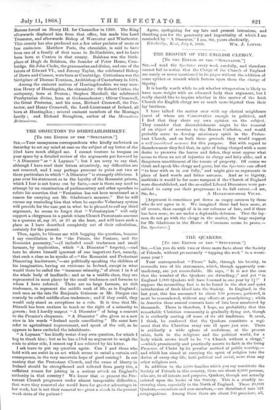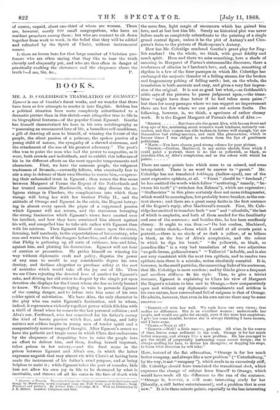THE QUAKERS.
[To THE EDITOR OF THE "SPECTATOR."] Sum,—Can you do with two or three more facts about the Society of Friends, without prematurely " tapping the rock " in a weari- some year ?
Your correspondent " Preno" fails, through his brevity, to reconcile two of his statements, which, though apparently con- tradictory, are yet reconcilable. Ile says, " It is not the case that the number of the Quakers are dwindling ;" and yet "in England 1,000 Quakers will have lessened in one year by l # !" I suppose the reconciling fact is to be found in the slow and quiet introduction of fresh blood into the Society. In England, in the last year, this has amounted to about 150 persons, gathered, it must be remembered, without any efforts at proselytizing ; while in America these annual converts have of late been numbered by thousands. There is therefore, I hope, no probability that this remarkable Christian community is gradually dying out, though it is evidently casting off some of its old traditions. It must, I think, be confessed that the Quakers constitute a regi- ment that the Christian army can ill spare just now. There is evidently a wide sphere of usefulness, at the present crisis, both in the religious and the political world, for a body which avows itself to be " a Church without a clergy," —which prominently and practically asserts its faith in the living Presence of Christ by its peculiar method of public worship,— and which has aimed at carrying the spirit of religion into the duties of every-day life, both political and social, more than any other religious sect.
In addition to the 5,000 families which you say constitute the Society of Friends in this country, there are about 6,000 persons, who are, to all intents and purposes, Quakers, though not actually entered upon the books of the Society. This is a steadily in- creasing class, especially in the North of England. These 20,000 Quakers,—members and non-members,—are distributed into 321 congregations. Among these there are about 700 preachers, all, of course, unpaid, about one-third of whom are women. There are, however, nearly 100 small congregations, who have no resident preachers among them ; but who are content to sit down together from week to week, in the belief that they will be edified and refreshed by the Spirit of Christ, without instrumental means.
Is there no lesson here for that large number of Christian pro- fessors who are often saying that they like to hear the truth cleverly and eloquently put, and who are thus often in danger of practically exalting the cleverness and the eloquence above the































 Previous page
Previous page